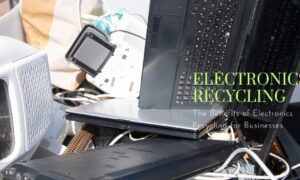The healthcare industry is increasingly reliant on technology, with medical devices, diagnostic systems, and patient-monitoring tools forming the backbone of modern care delivery. As innovation accelerates, outdated or obsolete healthcare technologies accumulate rapidly, posing a distinct challenge at the intersection of compliance, environmental responsibility, and patient privacy. Unlike typical consumer electronics, healthcare tech devices often store sensitive data and fall under specific regulatory frameworks. As a result, recycling them is not simply a matter of disposing of old hardware—it involves navigating a complex matrix of legal obligations and ethical considerations.
Unique Characteristics of Healthcare Technology
Medical devices and healthcare-related tech range from imaging machines and infusion pumps to wearable monitors, telehealth kits, and even simple electronic thermometers. Many of these devices are equipped with microprocessors, internal memory, sensors, and networking capabilities that allow for data collection, storage, and sharing. This data is often linked directly to individual patients and includes highly sensitive health records.
Healthcare technology is also heavily regulated during its use phase. It must adhere to standards concerning safety, effectiveness, and data protection. However, once these devices reach the end of their operational life, they shift categories—from active tools of care to electronic waste. At this point, a different set of concerns emerges: how to recycle or dispose of these devices without violating privacy laws or risking data breaches.
Compliance with Data Protection Regulations
One of the primary issues in recycling healthcare tech lies in ensuring compliance with data protection regulations. Devices that have stored patient information—even briefly—must be cleared of that data before being recycled, repurposed, or discarded. Failure to do so can result in unauthorized access to protected health information (PHI), potentially violating privacy laws and exposing healthcare providers or recyclers to legal consequences.
Healthcare data privacy laws typically require that any personal data be irreversibly erased or destroyed. This is particularly challenging for embedded systems or devices without clear user interfaces. In some cases, it’s not immediately obvious whether a device retains data locally, and accessing internal storage may require specialized tools or knowledge.
Moreover, the burden of compliance does not end with healthcare providers. Third-party recyclers and disposal firms handling healthcare tech may also be held accountable if data security protocols are not strictly observed. This highlights the importance of well-documented, verifiable procedures for data erasure or destruction at every stage of the recycling process.
Device Reuse and Its Privacy Implications
Another facet of compliance and privacy emerges when healthcare devices are considered for reuse or donation. While refurbishing and redistributing medical equipment can be an environmentally and socially responsible practice, it introduces a new layer of complexity in terms of data security. Devices must be sanitized not only physically, but digitally, ensuring that no residual patient data remains.
Some devices may also be preloaded with software that contains licensed health applications or links to hospital networks. If such systems are passed along without proper reconfiguration or access control, it could open backdoors to private systems or unintentionally leak institutional data. Ensuring that these risks are addressed is essential to safeguarding both individual and organizational information.
Institutional Policies and Training
Hospitals, clinics, and medical practices must have clearly defined internal policies for managing end-of-life healthcare technologies. These policies should outline roles and responsibilities, approved procedures for sanitizing devices, and steps for verifying compliance with data protection laws before recycling. Staff must be trained not only on the technical aspects of device disposal but also on the broader implications of privacy and legal compliance.
Documentation plays a critical role in this process. Maintaining records of what devices were decommissioned, how data was erased, and who handled each step can help protect healthcare organizations in the event of an audit or investigation. These logs also support accountability and continuity, especially in large institutions with multiple departments managing their own tech inventories.
The Importance of Secure Disposal Infrastructure
In many cases, the secure handling of healthcare tech at end-of-life hinges on having access to a reliable and specialized disposal infrastructure. Not all recycling facilities are equipped to handle the privacy and compliance requirements associated with healthcare devices. A gap in capabilities at this level can undermine even the most diligent internal procedures.
This makes it critical for healthcare providers to evaluate their disposal partners carefully. Key criteria should include not only environmental practices, but also their ability to securely erase data, track device chains of custody, and provide proof of compliant disposal. In some cases, physical destruction of certain components—such as memory chips or hard drives—may be the most prudent option to eliminate the risk of data recovery.
Looking Ahead: Integrating Privacy into Device Design
As the healthcare industry continues to digitize, there’s a growing opportunity for manufacturers to integrate privacy considerations directly into device design. This might include features like easy data-wiping mechanisms, removable memory modules for separate destruction, or end-of-life management instructions built into device software.
Such design strategies can ease the burden on healthcare providers and recyclers, ensuring that compliance with data privacy regulations does not rely solely on manual procedures or afterthought measures. Ultimately, this approach fosters a culture of security and responsibility that extends across the entire lifecycle of healthcare technology.
Conclusion
Recycling healthcare tech requires more than environmental consciousness—it demands rigorous attention to compliance and privacy. Devices that once played a role in patient care can become liabilities if not handled correctly at the end of their life. Ensuring that personal health data is protected throughout the recycling process is a legal and ethical obligation. By adopting comprehensive policies, investing in staff training, choosing the right disposal partners, and advocating for privacy-by-design in future technologies, healthcare institutions can meet these challenges while still advancing their sustainability goals.



































